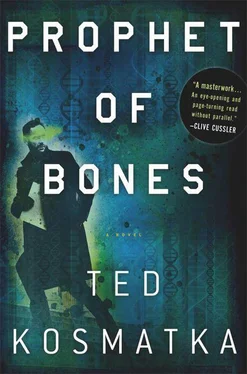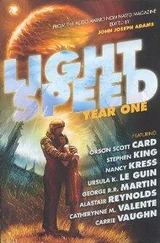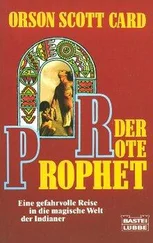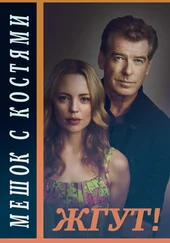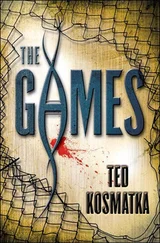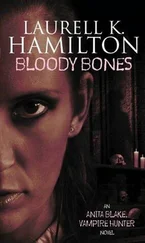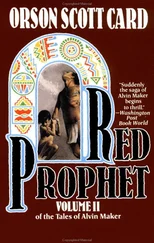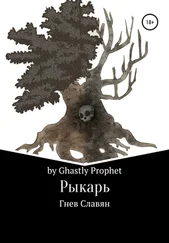Paul stared at the old man. “It’s an origin story.”
“Is it now? Come, sit,” the old man said. He gestured to a high-backed chair near the table. Paul sat, while the old man continued looking through his books. He took a pair of bifocals from the front pocket of his suit jacket and studied the spines, searching for titles he had in his head. One by one, he pulled down other books. Books on paleontology. Books on bones. And these books, too, like the Bible, were banned in various parts of the world, Paul knew. Or some of them, anyway.
“Tell me, Paul, did you find your room to be comfortable?”
“I’m not particularly interested in the accommodations.”
“I see; nor would I expect you to be. But still, so long as you aren’t uncomfortable, I suppose that’s fine. Aha!” The old man slid a book from its place on the shelf. “This is what I was looking for. Very rare, this one.”
He placed it on the table with the others and sank down into a nearby chair. They were sitting side by side, like dear friends. Paul imagined that a security camera recorded their every interaction. He pictured men in riot gear just outside the door, waiting to step in if he made the wrong move. But he could do it quick, he knew. But maybe not quick enough. Could he kill the old man before anyone had time to reach him? And then there was Lilli. Of course. And what would happen to her? The old man was no fool. For all Paul knew, there might be a gun trained on him right now, unseen.
“I knew your father for many years,” he said. “He was a talented scientist.”
“So I am told.”
“I see him in you.”
“Few people do.”
“Ah, but they’re not looking at the important things, are they?” The old man flipped through the pages of the book before him. He continued: “Aristotle wrote that, at his best, man is the noblest of all animals; also he is the worst. Your father and I had a parting of the ways. It pained me bitterly at the time, but I understood the reasons. Your father… was a difficult man, in many ways. Perhaps you knew this?”
“It escaped my attention.”
“Oh, I doubt that.” The old man smiled. “And your mother. She, too, was a brilliant worker, though perhaps not as gifted. Nor as afflicted. It is a trade-off, no? Do you understand about trade-offs?”
Paul understood.
“Let Lilli go,” he said.
The old man looked surprised. “So now it’s you who speak of trade-offs. Tell me, what do you have to trade, I wonder.”
“She has nothing to do with this.”
“Oh, but she does. Now.” The old man paused. “Paul, you must understand the position I’m in. This is a very delicate time—thanks in no small part to your own activities. The political situation is fragile at the moment, a circumstance you attempted to exploit to your advantage. Fortunately, Congressman Lacefield was amenable to negotiation.”
“He sold us out?”
“Traded you, more like.”
“For what?”
“Senate votes, of course. Politicians all have their constituencies to keep happy. And to be clear, the information you want to divulge would be uncomfortable to a large number of people on both sides of the aisle. The status quo is hardly ever served by rocking the boat.”
The old man opened the book lying before him. In it were large full-color prints of bones. It was a specialist’s book.
The old man’s eyes lingered on a glossy image of a skull. He touched the photo. “The magic is in the minutiae, isn’t it?” he said. “The careful measurement. The interpretations come and go like the tides, argued over like fashion, but the measurements themselves stay. Unassailable. I’m told that you’re a man who appreciates this also.”
“She won’t say anything, if you let her go.”
“In Java, Homo erectus. In Europe, Neanderthals. In Siberia, the newest DNA evidence points to something else entirely. As distinct as Neanderthals, but different. Bones found in a cave just outside Denisova.” The old man flipped through several more pages, his rheumy old eyes moving from photograph to photograph.
“ Homo erectus. Homo heidelbergensis, Australopithecus, Ramapithecus, all these different things. These, Paul, are what we bred with when we left our garden.”
“You’re mad,” Paul said.
The old man smiled. “You’ve seen so little. You can’t possibly understand it all. You’re like a fish calling a turtle mad for telling of dry land. Do you think this is just a theory of mine?”
The old man stood. He closed the book, hiding its photographs.
“Here, Paul, let me show you.”
* * *
They took the hall to a stairwell and then descended to a deeper level of the building. Two guards fell into step behind them. They’d been standing just outside the door of the library.
The old man pushed through a set of security doors and led Paul into a laboratory. “This is the anthropogeny lab,” he said.
The lab was white and sterile. Jars and microscopes graced shelves that lined one wall. Banks of computers occupied the other side of the room.
“It took us years to perfect the procedure,” the old man continued. “This is where we made them.”
“Made what, exactly?” Paul asked.
The old man ignored him, moving ahead with the guided tour. “The jars are the miscarriages. Chromosomal abnormalities, mostly.”
Paul saw then that the jars contained fetuses. A moment earlier, the jars had seemed to hold formless brown shapes that could have been anything. But now he recognized them for what they were, all at once, the whole wall of monsters. Arms and legs and twisted hands. Misshapen skulls. Faces like blooming flowers. Things with tails.
“The difference in chromosome count is small,” the old man continued. “But it does complicate things. Less in the first generation, though. Backcrosses are the real problem.”
“I still don’t understand.”
“You will. Follow me.”
Paul followed him through the lab to a set of double doors that led to a long hallway. He had a sense that they were leaving the main building and entering one of the wings.
The old man carded them through a security door, and they stepped into a dark room. A moment later, the lights clicked on with an audible click. They were standing in an enormous atrium. It took Paul a moment to recognize it for what it was. An ape house.
As if in response to the light, the apes moved to the front of their cages and began to call out. Soft hoots at first, but growing louder and more intense as the moments passed.
“This is where we house the juveniles,” the old man said.
Floor to ceiling, twenty-five feet high, cages were stacked one atop another like children’s building blocks. Each cage five feet cubed. Each housing a young chimp. The noise was deafening.
Paul lifted his hands to cover his ears.
The old man smiled. “Of course, the staff came up with their own name for this room.”
He spread his arms wide while the chimps shrieked all around them. The cages shook, the dark shapes inside spitting in rage.
“They call it hell.”
* * *
Lowering his arms, the old man continued walking. Paul stayed close, his hands still over his ears. Behind them, the two guards followed at a distance.
The old man led them through another set of doors and into an outdoor area. High cement walls closed them in. It was obviously an animal run of some kind.
“For the very young chimps,” the old man offered. “Before they get too dangerous.” At the far end of the run was a narrow steel door. He opened it with a key that hung around his neck.
“A bit old-fashioned,” he said. “But then, I’m an old man, and old-fashioned security gives me comfort at times.”
Читать дальше
